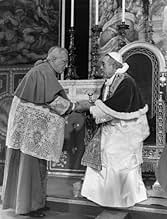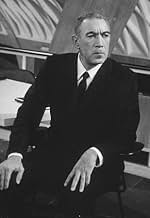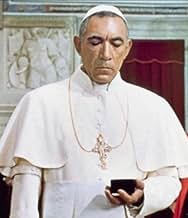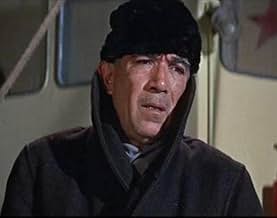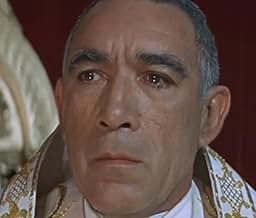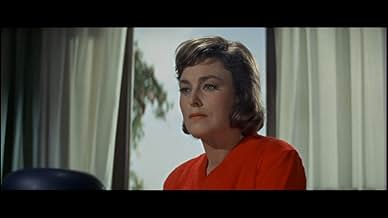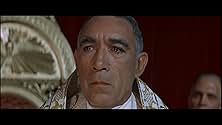Füge eine Handlung in deiner Sprache hinzuAfter spending decades in a Siberian Gulag labor camp, Roman Catholic priest Kiril Lakota is set free by Russian leader Piotr Ilyich Kamenev at the height of the Cold War.After spending decades in a Siberian Gulag labor camp, Roman Catholic priest Kiril Lakota is set free by Russian leader Piotr Ilyich Kamenev at the height of the Cold War.After spending decades in a Siberian Gulag labor camp, Roman Catholic priest Kiril Lakota is set free by Russian leader Piotr Ilyich Kamenev at the height of the Cold War.
- Regie
- Drehbuch
- Hauptbesetzung
- Für 2 Oscars nominiert
- 4 Gewinne & 5 Nominierungen insgesamt
- Piotr Ilyich Kamenev
- (as Sir Laurence Olivier)
- The Elder Pope
- (as Sir John Gielgud)
- Chiara
- (as Rosemarie Dexter)
- Gelasio
- (as Arnoldo Foa')
- Gorshenin
- (Nur genannt)
Empfohlene Bewertungen
It also a great example of life imitating art. Anthony Quinn is the former Archbishop of Lvov who was sent away for many years by the Communists to time in the Gulag. As a gesture of goodwill the Soviet Premier played Laurence Olivier gives him his release. Quinn and Olivier also have a history of their own, Olivier was the KGB official who interrogated Quinn back in the day and we know what their interrogation methods were like.
Upon reaching the Vatican, the Pope played by John Gielgud makes him a Cardinal. A few months later Gielgud dies and in the conclave to elect a new Pope, it's decided that Cardinal Quinn has some insight into an unbelieving part of the word that no one else possesses. So Quinn steps into The Shoes of the Fisherman.
So we have the first non-Italian Pope in 400 years as we shortly did in real life. Quinn inherits a world in crisis with China suffering from famine and threatening war against its neighbors to obtain food.
I can't reveal what Quinn actually did in the film, but it seems as though he took his cue from Pope Benedict XV who also tried to use his good office to end World War I and also organized relief efforts. In any event, he put it all on the line and I do mean all.
Tony Quinn and Laurence Olivier had a history of their own. They co-starred on Broadway in Becket with Olivier as Becket and Quinn as Henry II. Though there sure wasn't anything wrong with the film adaption that Richard Burton and Peter O'Toole did, it might have been nice to see the original cast perform this.
In fact my favorite in this film is Olivier. With the Soviet Union now broken up we can look back now and see the problems confronting each Soviet premier as they tried to hold their polyglot state of several republics together. Olivier's Kamenev is in the tradition of Leonid Brezhnev who was in charge at the time of the Soviet Union. It's with complete seriousness that the actor playing the Chinese premier calls him half a capitalist already. Of course when Mao died, the Chinese have become more than half capitalist themselves.
Others in the cast of note are Oskar Werner as a non-conforming Jesuit who espouses some heretical doctrine who Quinn finds intriguing and Leo McKern and Vittorio DeSica as a pair of politically astute Cardinals.
Good location shooting nicely blended with newsreel footage of crowd scenes give the film a real authenticity. I think Catholic viewers will like Shoes of the Fisherman especially.
The performance of Anthony Quinn as Kiril I is truly outstanding -- his Ukrainian accent, his almost mystical yet practical manner and his eloquent speeches make this an Oscar-worthy performance (why he wasn't nominated, I'll never know). Oskar Werner as Fr. Telemond was equally touching. Flattered at being chosen to be the pope's friend, secretary and confidant, he comes to realize he has taught the pope many things while learning a few things himself. Thinly based on the life of Fr. Pierre Teilhard de Chardin, Oskar Werner gives a moving performance as the terminally ill, brilliant but troubled priest-philosopher-thinker. This is by no means a perfect movie --- some of the clothes are dated and the music at the party where the reporter meets up with his mistress is annoying. But minor flaws aside, this is a wonderful movie that gives tremendous insight into the workings of the Vatican, the papacy and even the human heart.
Wusstest du schon
- WissenswertesIn the scene where Pope Kiril I (Anthony Quinn) prays over the body of the Jewish man, he recites the Shema. However, rather than say "Adonai," he says, "Hashem." This is because "Adonai" is traditionally only said when one is actually at prayer, and not simply reciting a prayer in a secular context, as in during a performance (specifically, in a movie).
- PatzerIn an on-air report, George Farber states, "after the sixth ballot, still only black smoke from the window of the Sistine Chapel." As a preceding shot demonstrated, the smoke rises from a stove pipe on the roof of the Sistine Chapel, not from a window.
- Zitate
George Faber: Were you permitted to practice your ministry as a priest?
Kiril Lakota: No, I - I practiced it without permission among my fellow prisoners.
George Faber: Do you see any hope then for the day when Christian faith, or more specifically the Roman Catholic faith, may be practiced freely in Marxist countries?
Kiril Lakota: I have no inside information as to how the Kingdom of God is going to be established.
- VerbindungenFeatured in The Shoes of the Fisherman (1968)
Top-Auswahl
- How long is The Shoes of the Fisherman?Powered by Alexa
Details
- Erscheinungsdatum
- Herkunftsland
- Sprachen
- Auch bekannt als
- Las sandalias del pescador
- Drehorte
- PalaLottomatico, Rom, Latium, Italien(meeting with Chinese leader)
- Produktionsfirma
- Weitere beteiligte Unternehmen bei IMDbPro anzeigen
- Laufzeit2 Stunden 42 Minuten
- Sound-Mix
- Seitenverhältnis
- 2.35 : 1
Zu dieser Seite beitragen



